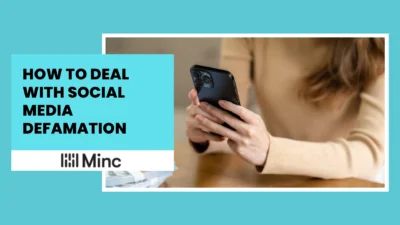
- Originally Published on December 8, 2021
What to Do If You Are the Target of Instagram Libel
If you have been libeled on Instagram, know that you are not alone. Whether you have been accused of sexual misconduct by an anonymous page, attacked in comments of your own post, or had impersonation accounts spreading lies about you, the effect of libel on Instagram can be pervasive.
If you are the target of Instagram defamation, it can be a difficult and painful experience. But, you can take steps to put an end to the defamation. If you are the target of Instagram libel:
- Preserve evidence of the libelous content by screenshotting the post, account profile URL, and any comments or messages,
- Report the libelous content or profile to Instagram by clicking the three dots above an individual’s profile or an abuse post, selecting ‘Report’, and following the on-screen instructions,
- Fill out Instagram’s Defamation Reporting Form (for Non-U.S. Residents), and
- Work with an experienced attorney to file a defamation lawsuit, send a demand letter, or obtain court-ordered removal of the libelous content.
At Minc Law, we have had great success removing defamatory content from popular social media sites like Instagram, Twitter, and Facebook. We also have significant experience in dealing with online abuse and bringing offenders to justice. We strive to get results as fast as possible while keeping these delicate situations out of the public eye.
In this article, we will explain how to determine if an Instagram comment is defamatory and what to do once you discover libel. We will also discuss how to report unwanted content on Instagram and what will happen if you must obtain a court order to get the content removed.
Are you the target of defamation?
Let us help. Contact us for a free consultation with an intake specialist to help you explore your removal options and craft an effective strategy.
Contact Minc LawHow to Determine if Something on Instagram is Libel
Defamation is the publication of a false statement of fact to a third party that causes harm to another’s reputation. There are two forms of defamation: slander and libel.
Slander is a false statement that is spoken aloud and heard by a third party. Libel, on the other hand, is a defamatory statement that is printed or published in some permanent form. Defamation that is published on the internet is referred to as internet defamation – and it mostly falls under the category of libel.
What Are Some Examples of Libel on Instagram?
Most Instagram defamation constitutes libel and is considered a form of social media defamation. Some common examples of Instagram libel include:
- False Instagram posts,
- Unfounded and baseless comments,
- Fake and malicious captions,
- Photoshopped pictures or memes,
- Messages communicating false statements of fact, and
- Fake profiles.
Comments are the primary area where we see the most defamation on Instagram, however anonymous and impersonation accounts are increasing in popularity and can be equally damaging.
It is also possible to see slander on Instagram although it is slightly less common than libel. Defamatory statements made in the course of a live stream or during a video could fall within the category of Instagram slander.
For more information specific to slander on Instagram, check out our comprehensive resource by paralegal Melanie Hughes explaining how to handle slander on Instagram.
What Are Instagram’s Community Guidelines in Relation to Libel?
Like most social platforms, Instagram users agree to abide by the platform’s Community Guidelines when they sign up to use the site. 1 Trusted Source Instagram Community Guidelines (2021). In general, users agree to follow the law and respect other members of the Instagram community. Not only are users prohibited from illegal activities (like making a drug transaction over the platform), but users must comply with copyright laws as well. Instagram specifically asks that users share only photos and videos they have the right to share.
Posts or other interactions that constitute bullying, harassment, or hate speech will also be removed (if reported). While we consider libel akin to bullying, it can be more difficult to get libel removed from Instagram. For example, a comment that states, “I want to hurt every person of that race!” would be a clear-cut violation of Instagram’s rule against hate speech. Also, suggesting that an individual should commit suicide will be removed for cyberbullying.
In contrast, libel may be subtler than overt racism or cyberbullying, particularly if the negative comment contains language that could potentially be true. Instagram moderators will rarely insert themselves in the role of referee and judge to determine whether content constitutes defamation.
If you try to report defamation in the United States, you will likely receive a message stating, “Instagram is not in a position to adjudicate the truth or falsity of statements made by third parties, and consistent with Section 230(c) of the Communications Decency Act, is not responsible for those statements. As a result, we are not liable to act on the content you want to report.”
How Can You Determine if What You Are Experiencing on Instagram is Libel?
If you recall, defamation is a false statement, made to a third party, that hurts the reputation of another. Say, someone posts a comment on Instagram under your image claiming that you are a pedophile. Assuming you have never been charged with such a crime, the person who made that comment is likely liable for defamation because:
- They published a false statement purporting to be fact,
- That was seen by third parties,
- They were at least negligent in making the statement, and
- Reputational damage can be presumed because it implies you committed a crime (libel per se).
While falsely accusing another person of pedophilia is an obvious form of defamation, not all defamatory statements are so explicit. The best way to determine if you have a claim for libel is by consulting with an experienced online defamation attorney.
How to Take Action Against Defamation on Instagram
There are a few different ways to deal with defamation on Instagram, however, some steps are necessary no matter how you decide to proceed.
In a nutshell, you will need to preserve evidence of the defamation regardless of whether you report the post to Instagram moderators or decide to file a defamation lawsuit.
How Do You Go About Preserving Evidence of Libel on Instagram
Depending on whether the material has already been deleted, you can gather evidence in a variety of ways. Preserving proof of content that is still online will be less difficult than preserving evidence of content that has been removed.
Screenshot the Content Using Your Computer or Phone
If the content has not been deleted, you can take a quick (and free) screenshot of the defamatory post or profile with your computer or phone.
Use Professional Screenshotting Software
Likewise, you can use professional screenshotting software like PageVault or Visualping to capture a full-page image of the web page in question. This software may also enable timestamping and continued monitoring of search results to track additional defamatory content.
Use the Wayback Machine to Find Old or Deleted Posts
If you are unable to find the original post (either because it has been deleted or it is just archived), you can use a service called The Wayback Machine. The Wayback Machine archives web pages so that users can view pages as they existed in the past.
Use Google Cache to Trace Old Webpages as You Viewed Them
If you use Google, you can also use Google Cache to view old web pages as they existed the last time you viewed them in Google.
Capture the URL
If possible, you should always capture the unique URL for each post or profile that you believe to be defamatory. While individual comments do not have a unique URL, accounts and posts do, and those URLs should always be preserved as well.
How to Report Libel to Instagram
If you reside outside the United States, one of the simplest ways to deal with Libel is by using Instagram’s Defamation Reporting Form. 2 Trusted Source Instagram Defamation Reporting Form (2021). In the United States, social media platforms are protected from liability for unlawful content posted to their site by Section 230 of the Communications Decency Act. This means the Defamation Reporting Form can only be used by those who live outside of the U.S.
For targets of libel on Instagram who live in the United States, there are still other reporting options. You can report Instagram defamation by:
- Reporting the defamer’s profile,
- Reporting a defamatory post through Feed, or
- Reporting the content for harassment or bullying.
It may help to look at each reporting option and discuss when it is best used.
How to Report an Instagram Profile For Libel
You can report an Instagram profile for spam, nudity, hate speech, violence, bullying, intellectual property violations, and other illegal activity. 3 Trusted Source Instagram Help Center. How Do I Report a Post or Profile on Instagram? (2021). This tool is especially useful when an Instagram user has multiple instances of defamatory content or illegal activity throughout their profile.
To report a profile:
- Tap the individual’s username from their Feed or story (or search their username to navigate to their profile).
- Tap the three dots (“…”) in the top right of the profile,
- Tap Report, and
- Follow the on-screen instructions.
How to Report an Instagram Post For Libel
If an individual post (or a comment under a post) violates Instagram’s Community Guidelines, you can directly report the post.
To report an Instagram post for libel: 3 Trusted Source Instagram Help Center. How Do I Report a Post or Profile on Instagram? (2021).
- Tap the three dots (“…”) above the post,
- Tap Report, and
- Follow the on-screen instructions.
How to Report Harassment or Bullying on Instagram
Another option for reporting Instagram defamation is to complete a harassment or bullying Report. 4 Trusted Source Instagram. Report Harassment or Bullying on Instagram (2021). You can submit this form of a report even if you do not have an Instagram account.
To report harassment or bullying to Instagram:
- Click the three dots, (“…”) in the top right of the user’s profile or above the post, or navigate to the Report form linked above,
- Tap Report, and
- Follow the on-screen instructions
What Happens When You Report an Account on Instagram?
Most people worry that reporting an abusive or fake account will only lead to more attacks. It is worth noting that Instagram keeps all reports anonymous, so the person you are reporting will not find out that it was you. Instagram will look into the matter without providing any confidential information to the reported user.
How Many Reports Does it Take to Delete an Instagram Account?
Instagram does not have any hard and fast rules regarding how many reports a user can receive. An account may be reported once and get banned immediately, and some accounts may receive several reports without getting banned – it differs according to the specific facts and circumstances of each report.
Working with an experienced online defamation attorney may improve your chances of getting a user banned for unlawful account activity.
Send a Demand Letter to the Instagram Defamer
A demand letter can be used to notify a defamer that you intend to file a defamation lawsuit if they do not cease the Instagram defamation.
A demand letter is a formal request to have defamatory or libelous material removed (and the behavior put to an end). It also gives you the chance to explain why the content is defamatory. A well-written demand letter may be all it takes to remove defamatory content and prevent further defamatory statements in some situations. If the defamer refuses to comply, you can still proceed by filing a defamation lawsuit.
When we send a demand letter on behalf of clients, we usually demand the perpetrator refrain from similar behavior in the future and remove the post. In certain situations, we will demand the perpetrator print a retraction. We may also request compensation for damages suffered as a result of the defamation.
Obtain a Court Order to Remove Defamation on Instagram
If you have a valid defamation claim, you might need to file a lawsuit to obtain a court order requiring the removal of the libelous content. Unlike reporting unwanted content to Instagram, you may recover financial damages (or punitive damages) in a defamation lawsuit.
Before filing a defamation lawsuit, you will need to determine whether your matter is within the defamation statute of limitations (usually one year from the date the statement was published) and where you can file your lawsuit.
Once you determine whether a lawsuit is an option and where you plan to file your complaint, you will need to take the following steps to obtain a court order to remove content:
- Identify the defamer if you are unsure who they are,
- Draft a legal complaint,
- Serve the defamer with a copy of the complaint,
- Present evidence that supports your claim before a court,
- Obtain a court order directing Instagram to remove the content, and
- Submit the court order to Instagram.
Who You Can Sue For Defamation on Instagram
In general, U.S. residents can only sue the individual who posted the defamatory content on Instagram.
Instagram, like other social media platforms and websites, is immune from liability for defamation due to Section 230 of the Communications Decency Act. Therefore, you generally cannot sue social platforms like Instagram for defamation, unless one of several narrow exceptions to Section 230 applies
Can You Sue Someone For Libel on Instagram?
The simple answer is yes, you can potentially sue someone from Instagram libel. But lawsuits are frequently expensive and rarely simple, so it is best to consider litigation alternatives before diving into a lawsuit.
Before filing a lawsuit, you need to ensure you have proof of a valid defamation claim – and you need to be prepared to go after the individual defamer, not Instagram themselves. You will also need to comply with several pre-suit requirements, like the statute of limitations, and determine the best jurisdiction for filing a lawsuit.
How Can You Sue For Defamation in Relation to Instagram Libel?
To file a defamation lawsuit for Instagram libel, one must follow the same four steps:
- Determine if you have a valid defamation claim,
- Identify where to file your lawsuit,
- Comply with pre-suit filing requirements, and
- Draft, file, and serve your legal complaint
Determine If You Have a Valid Defamation Claim
Before filing any civil lawsuit, you must first determine whether you have an actionable claim. To sue for Instagram libel, you need to consider:
- If someone made a false statement of fact about you (or your business),
- It was published or communicated to at least one other person,
- The person who made the statement was at least negligent in determining whether the statement was true or false, and
- The statement(s) caused damage to your reputation.
Identify Where to File Your Lawsuit
In many online defamation cases, you can potentially file a defamation lawsuit in more than one state. You can generally file a lawsuit in the state:
- Where you live (or your business operates),
- Where the defendant lives (or operates their business),
- Where your customers live,
- Where you experienced damages due to the defamation, and
- How much money you aim to recover.
You may select one jurisdiction over another for its convenience, defamation statute of limitations, or where you have an increased chance of legal success (due to the lack of Anti-SLAPP laws or other defamation defenses).
Comply With Pre-Suit Filing Requirements
Depending on where you opt to file your lawsuit, you may have to comply with differing pre-suit requirements. If you fail to comply with a particular state’s pre-suit filing requirements, you run the risk of your case being dismissed from the outgo.
For example, in Florida and Michigan, for instance, you may have to give the defamer notice that you intend to sue before you file suit.
Draft, File, & Serve Your Legal Complaint
The final step in starting a lawsuit is filing a complaint. A complaint is merely a legal document that tells the defendant why you are suing them and what damages you suffered.
Drafting an effective libel claim can be difficult, so it may be wise to hire a defamation attorney to help draft your libel claim. The complaint will require basic facts about who was involved in publishing or sharing defamatory content, what statements were made, and how the publication harmed your reputation.

What Else Should You Know About Suing For Defamation on Instagram?
As mentioned a few times in this article, Section 230 of the Communications Decency Act protects platforms like Instagram from liability for content posted to their website. Unfortunately, because usernames can often hide a poster’s true identity, victims of social media defamation often have to determine who is behind a username.
Providers of interactive computer services or platforms, including Google and social media sites like Instagram and Facebook, might be held responsible for each message posted using their services if they were not given broad immunity by Section 230. This would make it prohibitively costly for these websites to let users post material on their platforms and many sites would likely shut down otherwise.
Courts generally employ a test to determine if an interactive computer services platform can claim immunity for content posted to their site:
- The defendant must provide an interactive user experience, and
- The statement was made by a user or another content provider other than the defendant ISP.
As long as platforms like Instagram can prove immunity, a plaintiff will need to identify the actual user who posted the content to sue. It is possible to identify an anonymous poster or defamer, but that may add time, effort, and additional costs to a defamation lawsuit.
How a Legal Team Can Help With Libel on Instagram
Libel is a highly complex legal concept – regardless of where it takes place. If non-litigation alternatives like reporting libel do not lead to its removal from the internet you may need to hire an attorney to discuss your legal rights.
During your attorney, an experienced internet defamation attorney should be able to advise you whether or not you have a valid claim for libel. If so, they can also help you determine your next steps to maximize your chances of legal success.
When Should You Decide to Hire a Legal Team to Take Action Against Defamation?
The simplest answer to this question is when your online defamation is becoming unbearable and you feel a response is warranted. However, every situation is different and legal solutions are not one-size-fits-all.
If you have exhausted all options of removing the content independently (e.g. you’ve already reported the content to Instagram) it may be worth speaking to an internet defamation attorney. Of course, you should also consider the potential risks of legal maneuvers.
The Streisand Effect is a well-known phenomenon whereby an individual can inadvertently draw more attention to content by attempting to hide or suppress said content. In other words, poorly considered legal maneuvering can, in some circumstances, cause more damage than less litigious requests.
Video: What is the Streisand Effect & How Do I Avoid It?

Yet, an experienced internet attorney may help you avoid the Streisand Effect and increase your chances of achieving the outcome you desire. The point is that you should discuss your goals with a professional before making any rash decisions that could backfire.
What Should You Look For in a Legal Team If You Are Suing For Defamation on Instagram?
It can be difficult to know what you are looking for in a legal team when you are struggling with defamation and cyberbullying. The best way to find an experienced defamation lawsuit attorney is to look for someone:
- With experience dealing with Instagram defamation,
- That you are comfortable working with,
- Who is responsive to your needs, and
- Who can work within your budget.
What Can You Accomplish By Taking Legal Action Against Libel on Instagram?
A skilled internet defamation litigation team can assist you in navigating the social media reporting process. They can also contact social media moderators on your behalf and help you gather any evidence necessary to prove your case.
It may be tough to have defamatory material deleted from social media platforms. This is in part due to the complexity of defamation law, and also because platforms are unwilling to become judges in private conflicts. This is why it is helpful to have a legal expert on your side – to convince neutral third parties to remove otherwise unlawful content.
A legal team can help:
- Obtain a court order to remove defamatory content from Instagram,
- Secure monetary compensation for damages caused by the defamation,
- Identify anonymous defamers,
- De-index unwanted content from search results, and
- Request the preservation of evidence from a platform (if litigation is imminent).
How Minc Law Can Help You Take Action Against Libel on Instagram
At Minc Law, we act as a single point of contact for everything related to internet defamation. That means we can help you report Terms of Service violations, work with Instagram counsel to resolve legal issues, and file a defamation lawsuit to obtain a court order on your behalf.
★★★★★
“Minc Law and Dan Powell worked closely with us to get defamatory material removed from social media sites. We would not have been able to get this accomplished without them. They are true professionals, and have the resources and skills to guide clients through the process to a successful resolution.”
Jen Duncan, March 4, 2022
We are also knowledgeable in the subtleties of defamation law, so we can help you avoid risks like the Streisand Effect and increase your chances of a successful legal outcome.
If you would like to find out if you have a valid claim for Instagram libel, call 216-373-7706 for a free, no-obligation or complete our online contact form.
Get Your Free Case Review
Fill out the form below, and our team will review your information to discuss the best options for your situation.
This page has been peer-reviewed, fact-checked, and edited by qualified attorneys to ensure substantive accuracy and coverage.




